Choosing the right eCommerce platform is the most crucial part of starting an eCommerce business – you want a platform that provides easy inventory management, secure payment solutions, and flexibility in designing and building your online store.
There are hundreds of eCommerce platforms in the market that you can choose from – but let’s be realistic, you can’t try all the platforms and decide, right?
This is where EcomSutra comes into the picture – to save you time and help you make educated decisions!
In this article, I have compared and reviewed some of the best eCommerce platforms, from advanced to simple platforms you can use to build and grow your eCommerce website.
How to Choose the Best Ecommerce Platform?
Almost every eCommerce platform comes with essential features like product management, inventory management, payment processor, and others. However, there are a few key factors that you must consider while deciding on the ecommerce platform for your business –
- Technical skills – Are you a coder or website developer? Do you have a technical team? If yes, open-source platforms like Magento and OpenCart can be a good option. If not, try platforms such as Shopify, Bigcommerce, and Ecwid.
- Budget – Your initial budget for the ecommerce business will be determined by the eCommerce platform you choose. So, deciding on a platform based on your budget is important. Next, you must also account for the costs of building and managing the store.
- Business model – Not all platforms are designed to support all eCommerce business models. So, you must first define your business model before selecting the most appropriate platform for your ecommerce business.
- The number of products – The primary feature of an e-commerce platform is product management. So, determine how many products you want to sell, and based on that, pick a platform that allows you to list your product within your budget.
- Type of products – Certain e-commerce platforms allow you to offer a variety of products, while others limit to specific types, such as digital products. So, figure out the products you will sell on your site.
- Payment Methods – The transaction fees can differ among various ecommerce solutions. You must examine the integrated payments of each platform to check whether it supports your preferred payment gateway or if you can utilize one of their payment partners.
Apart from these factors, you also want an eCommerce platform that provides active customer support and lets you add additional functionalities to your eCommerce website.
Top 7 Ecommerce Platforms for Online Stores
Now you know what you should be looking for in an eCommerce platform. So, create your checklist based on the above-listed factors, and start your research.
Here’s a quick overview of the best eCommerce platforms –
| Ecommerce Platforms | Starting Price | Offer |
|---|---|---|
| Shopify | $23/month | Create a store at $1/month |
| BigCommerce | $29.95/month | Start 15-day Free Trial |
| Squarespace | $27/month | Start 14-day Free Trial |
| WooCommerce | Free Forever | Create Free Online Store |
| Wix | $27/month | Try for Free |
| Weebly | $12/month | Try for Free |
| Volusion | $31.50/month | Start 14-day Free Trial |
Now, let’s dive deep into each platform to determine the most suitable one for your eCommerce business.
Ready? Let’s get started.
1. Shopify

Shopify is the most popular eCommerce platform. In fact, whenever someone decides to start an eCommerce business, Shopify is the first name that comes to mind.
As an eCommerce platform, Shopify is extremely easy to use and set up without any technical skills required. It offers 70+ mobile responsive themes, among which nine are free, which is great if you want to try Shopify for a while before investing in the look and feel of your site.
The best part is that themes are not limited to the Shopify Theme store. You can also find beautiful and high-converting Shopify themes on marketplaces like ThemeForest, developed by Shopify experts and compatible with popular Shopify apps.
Similarly, even though Shopify offers its in-house payment gateway, Shopify Payments, it supports other popular payment gateways from every country. So, whether you are based in the USA, UK, India, China, Kenya, or anywhere in the world, you will certainly find your regional payment gateways supported by Shopify.
Going ahead, to extend your store’s features and functionalities, you can always head over to the Shopify App Store, where you can find a ton of apps that you can install and seamlessly integrate the store with third-party software.
Overall, Shopify is a great option for anyone to start an online store at a nominal charge without any technical hassle. Want to learn more about its features? Read our detailed Shopify review for everything you need to know.
Pros of Shopify –
- Easy to set up
- Variety of themes
- Built-in marketing & SEO tools
- Supports multiple payment processors
- Multiple-channel sales distribution
- Seamless 3rd-party integrations via Apps
- 24/7 technical support
Cons of Shopify –
- Limited customization
- High Transaction fees on the basic plan
- No Email Hosting
Pricing Plans – Shopify has three plans starting at just $23/month and going up to $299/month. It charges transaction fees on all plans, depending on your chosen plan. It offers a 3-day free trial, and you can use it for 3 months at just $1/month.
Further Reading –
Further Reading –
- Best WooCommerce themes
- Best WooCommerce hosting platforms
- Best WordPress plugins for eCommerce sites
2. BigCommerce

BigCommerce is a well-known eCommerce platform providing everything you need to sell online. It is ideal if you want to build a store with some complex features and a huge inventory to manage.
The platform offers unique solutions for B2B, wholesale and subscription-based stores. And its conversion-friendly, customizable themes enable you to build any kind of store to sell anything online.
BigCommerce’s abandoned cart recovery shipping integrations and multichannel distribution features are some of the best in the industry but not available at the lower tiers.
And unlike Shopify, instead of charging a fee per transaction, BigCommerce puts a limit on sales revenue per tier. Once you reach the sales limit of your selected tier, the plan will automatically be upgraded.
BigCommerce excels in the SEO performance of the site, loading speed, scalability, and security. So, whether you’re starting a new online store from scratch or introducing your brick-and-mortar store into the eCommerce world, it can be a viable option.
You should read our detailed BigCommerce review to learn more about its features and functionalities.
Pros of BigCommerce –
- Drag and drop page builder
- Built-in sales & marketing tools
- Highly flexible and scalable
- Ecommerce apps & extensions
- Multichannel sales distribution
- No transaction fees
- 24/7 customer support
Cons of BigCommerce –
- Limited Free Themes
- Annual sales threshold
- Cart abandonment recovery is not available for the basic plan
Pricing Plans – BigCommerce allows unlimited products and staff account on all plans. It has 3 pricing plans starting at just $29.95/month, allowing up to $50k. It offers a 15-day free trial on selected plans.
Further Reading –
- Best BigCommerce themes
- Must-have BigCommerce apps
3. Squarespace
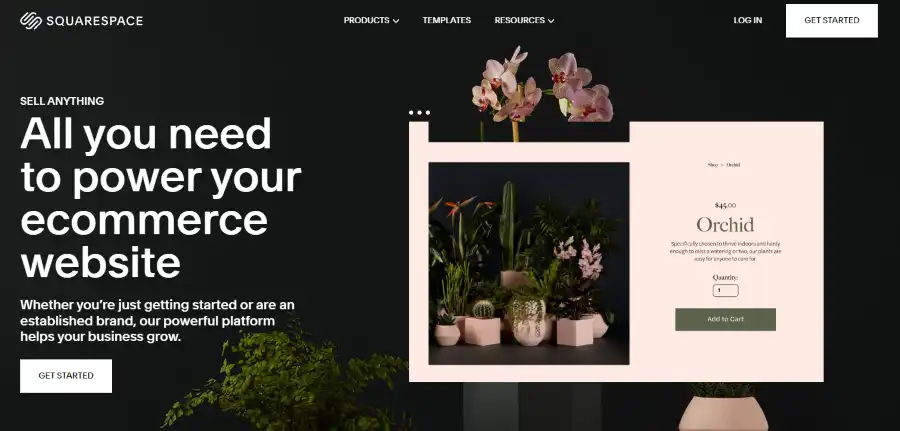
Squarespace is a popular drag-and-drop website-building platform that offers many mobile-optimized and customizable themes for online stores. It is the best eCommerce platform for artists selling artwork such as videos, photographs, graphics, etc.
Squarespace offers dozens of eCommerce benefits, including unlimited product listing, flexible product variants, gift cards, and abandoned cart recovery.
With Squarespace, you can easily build a subscription-based store, but the challenge is that there are very limited apps that you can integrate with. So, before getting started, ensure it offers all the essential tools and plugins you need for your store.
Another great thing about Squarespace is that it offers a free domain for the first year of your subscription and has very cheap plans to get started with.
So, if you’re unsure of the future and want to try your hands on an eCommerce store with all the essential features, Squarespace is a platform for you. That’s because this platform makes it affordable and easy for you to scale or pivot the direction of your sales strategy.
You can also read our Squarespace review to learn more about its features and determine how it can be helpful for your eCommerce business.
Pros of Squarespace –
- Easy to set up
- Great theme designs
- Solid SEO tools
- Built-in marketing tools
- Built-in shipping and fulfillment options
- Mobile app for iOS & Android devices
Cons of Squarespace –
- No Marketing Automation Integration
- No Multichannel distribution
- Limited 3rd-party integrations
Pricing Plans – Squarespace has 4 paid plans starting at just $16/month. However, the eCommerce features are available from the Business plan, costing $23/month. It offers a 14-day free trial on selected plans.
Further Reading –
4. WooCommerce
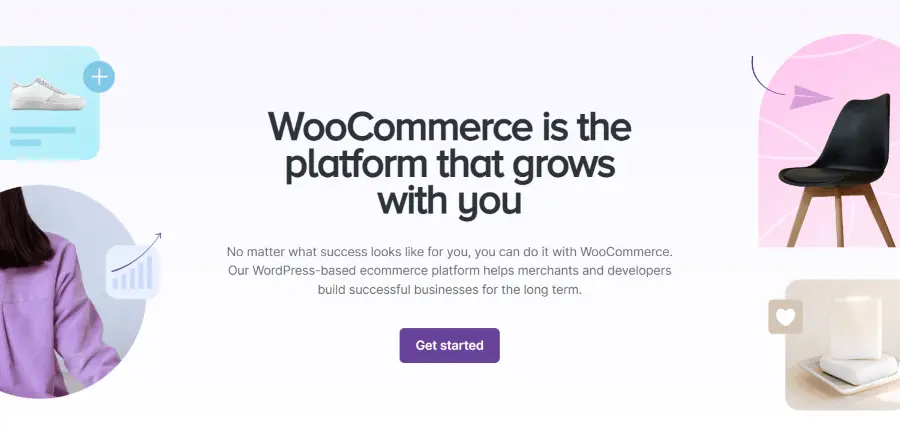
WooCommerce is the best free platform to create eCommerce websites. It is a popular WordPress plugin that adds eCommerce functionalities like product management, checkout, etc., to your WordPress websites.
Being open-source software, WooCommerce is highly customizable and scalable. It is backed by active WordPress developers who consistently bring new plugins and themes to make it easy for anyone to customize the store without writing a single line of code.
Like Shopify, you can also find thousands of responsive and customizable WooCommerce themes on theme marketplaces like ThemeForest. Most of these themes are compatible with popular WordPress plugins and extensions, enabling you to add more functionalities to your WooCommerce store to boost conversion.
Bottom line, if you are looking for a free eCommerce platform that enables you to build a robust online store without requiring technical knowledge, WooCommerce would be my top recommendation. It is easy to use and packed with powerful eCommerce features to help you grow your business consistently.
Pros of WooCommerce –
- Easy to use
- Free & Paid Themes
- SEO-friendly
- Highly Customizable
- Supports multiple payment gateways
- Thousands of plugins & extensions
- Compatible with popular eCommerce tools
Cons of WooCommerce –
- No Customer Support
- Need lots of extensions to add basic features, and it costs
Pricing Plans – WooCommerce is free to use. However, you will have to invest in reliable web hosting, themes, and other plugins, ultimately adding costs. However, even adding all the costs is cheaper than most premium eCommerce platforms.
5. Wix
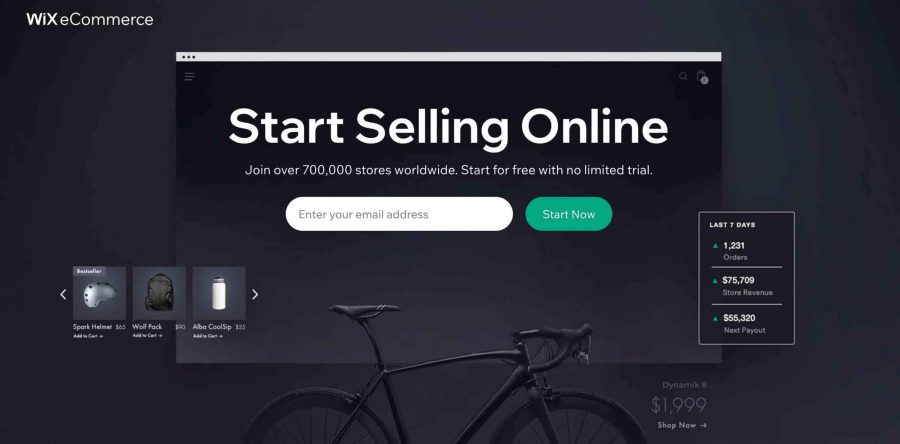
Wix is another popular drag-and-drop website builder which you can also use to build online stores. The website builder is user-friendly and easy for beginners with no technical knowledge.
Wix offers over 500 stunning templates that are likely to fit your business. Wix eCommerce functionality has most of what a business would need but doesn’t scale as well as dedicated platforms like Shopify or BigCommerce.
Wix also provides an in-house payment gateway called Wix Payment, along with other popular gateways, including Stripe and Paypal. The best part is that it doesn’t charge any transaction fees – you just have to pay for the plans you pick for the store.
Other useful features include multi-channel distribution, worldwide shipping and tax, auto email reminders, coupon, and discounts. You can read our Wix eCommerce review to learn more about its features and functionalities.
Pros of Wix –
- Beginner Friendly
- Free domain for 1 year
- Good SEO
- Optimized for Dropshipping
- 24/7 customer support
Cons of Wix –
- Cannot change the theme later
- Lacks marketing features and integrations
- limited features in the basic plan
Pricing Plans – Wix allows creating a free online store but to sell the products, you will have to opt for one of its eCommerce business plans, starting at just $23/month.
Further Reading – How to create an online store on Wix
6. Weebly
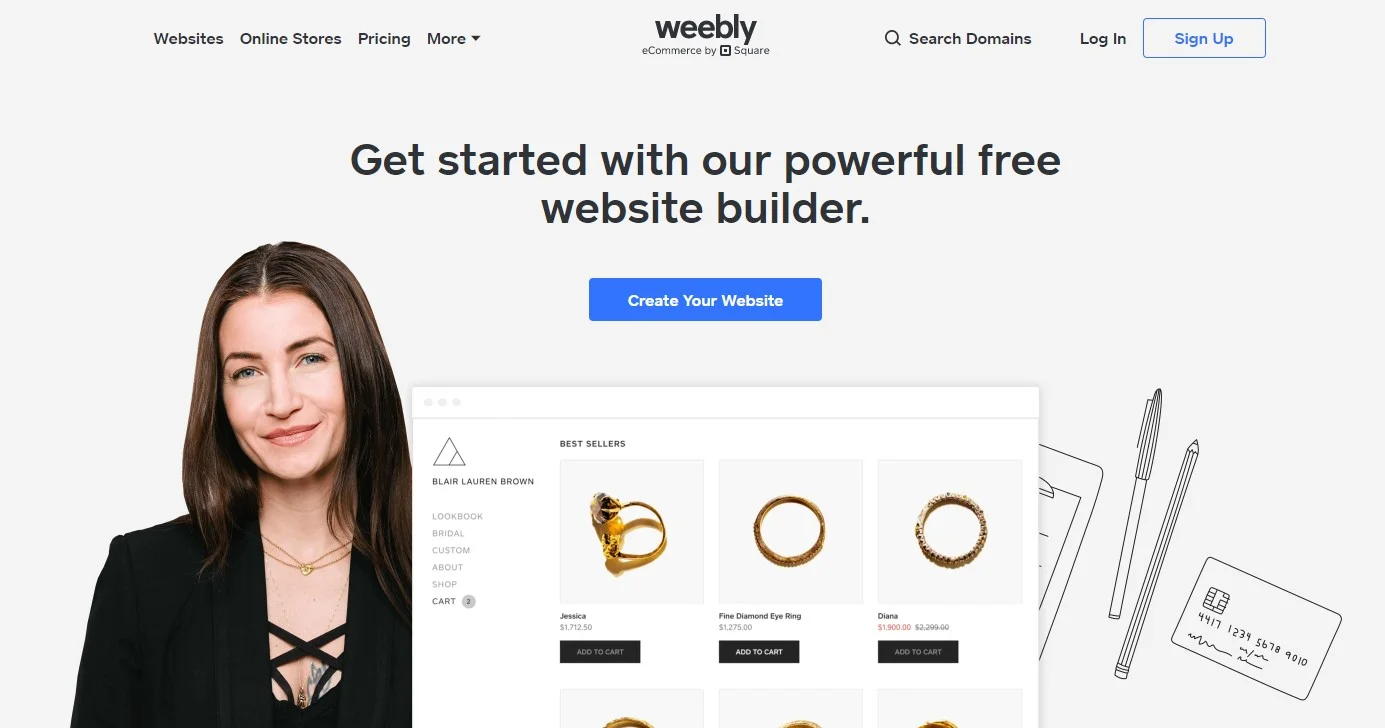
Weebly is a popular website builder that enables you to build an enticing eCommerce store. With its free website builder, you can customize page designs by choosing from the collection of bold and responsive themes for your business.
Building an online store on Weebly is a smooth process. It offers an intuitive drag-and-drop builder which lets you launch your dream online store. It also comes with a suite of marketing tools that enables you to interact with your customers to boost conversions.
You can use its customizable email templates to remind customers about their incomplete purchases or send a welcome email to greet new customers. It optimizes your site for high organic traffic, and you can effectively track results via its in-depth analytic tools.
Furthermore, it offers a reasonable set of integrations via its app center. The categories include shipping, reporting, communication, marketing, social media tools, bookings, etc., to expand your store functionality.
Pros of Weebly –
- Very affordable pricing plans.
- Free SSL Security and unlimited storage.
- Accept payments through 3rd party providers.
- Excellent customer support in all the plans via chat, email, phone, and community forum.
- Offers advanced site statistics.
Cons of Weebly –
- Ideal only for small companies.
- Handling backup and restoration lies in your hands.
- Unlike Wix, Weebly does not offer an ADI to set up your store.
Pricing Plan – Weebly has a free plan to create a basic website. For eCommerce features, you will have to opt for the Pro plan, costing $12/month, allowing accepting payment via Square and other third-party payment gateways.
7. Volusion
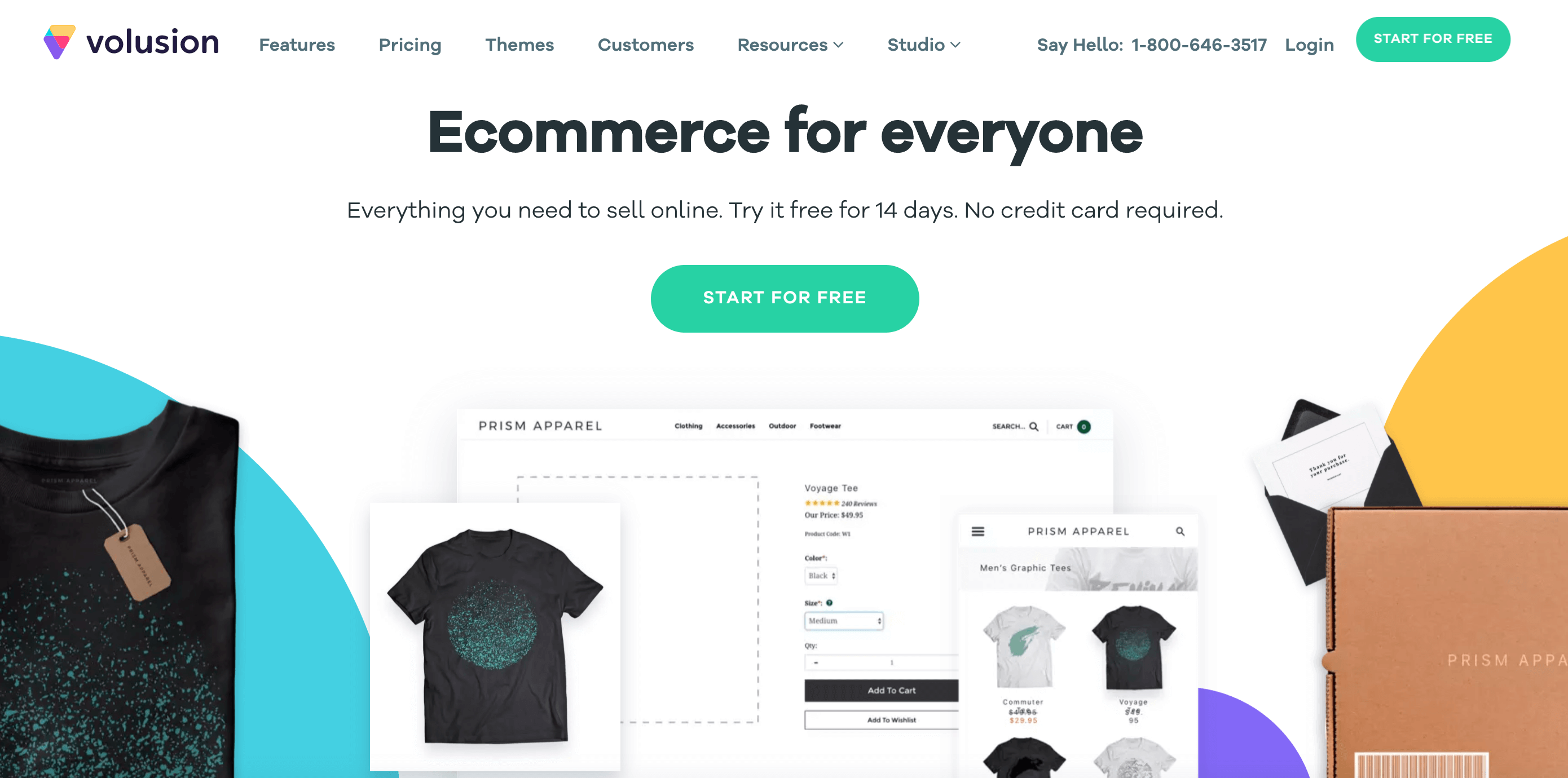
Volusion is one of the oldest eCommerce platforms available out there. It provides an all-in-one eCommerce platform that lets you easily create, manage, and expand your store.
Volusion has everything you need to build your store your way. It offers 11 free and 34 premium themes. These templates are mobile responsive, and you can easily customize and add required elements using their drag-and-drop page builder. You can tweak them further with CSS.
The other main features are built-in SEO tools, social media integrations, ROI tracking tools, related products feature, customer accounts and reviews, discount codes, and gift cards. Abandoned Card recovery is also available but not for the basic plan.
Similar to BigCommerce, Volusion doesn’t charge transaction fees but puts a cap limit on annual revenue. If you exceed certain sales milestones in 12 months, your plan will automatically be upgraded for the next year.
Pros of Volusion –
- Multi-channel distribution
- Recurring payment methods are available
Cons of Volusion –
- No built-in blogging section.
- Expensive themes
- No Cart abandoned recovery for the base plan
Pricing Plans – Volusion has 3 pricing plans with an annual sales cap limit for each plan. The plan starts at $35/month and goes up to $299/month. For unlimited sales and products, you can contact their sales team.
Wrapping Up
By now, you should have picked the best platform to build your online store. However, if you are still wondering what to try first, here are a few of my recommendations that you can consider –
- If you’re just starting with an eCommerce business and don’t have the technical knowledge or a large team to manage your store, Shopify, Wix, or Squarespace would be the best platform to consider.
- BigCommerce will be the perfect platform for your eCommerce business if you expect faster growth. It is highly scalable and gives you complete control over the store to offer unique designs and features to your customers.
- If you have a limited budget but no technical knowledge to build an online store, you should try Weebly. It is easy to use and provides all the basic requirements to build and manage your store at an affordable price.
- If you are looking for a highly customizable eCommerce platform with less technical knowledge, you can consider WooCommerce.
Rest assured, all the platforms listed above are the best in the class and have something unique to offer. So, you must be very clear with what you want for your store and choose the eCommerce platform that suits your business model.
I hope this article helped you pick the best eCommerce platform for your business. If you are looking for more niche-specific eCommerce platforms, then you should check these articles next –



